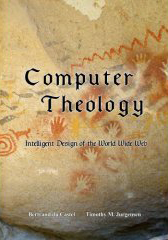PRESS
COMPUTER THEOLOGY |
||||
|
acceptable degree of trust can be
established, a protocol can be enacted between multiple parties through which a
transaction can take place, enabling the parties to negotiate to an agreed upon
conclusion; to wit, in this case getting the door open. “Well,” one
might be considering at this point, “how does this consideration of trust and policy
impact either on the reality presented by computers and computer networks or
the social reality of religions and their guiding theologies? If there’s any
substance to the book’s title then there ought to be some relationship,
correct?” We respond that “Indeed, there is!” Correspondingly, this book is an
attempt to relate the development and evolution of computer technology to the
development and evolution of humans and their social environments, particularly
as these environments are impacted on or defined by religious systems. Our
review of the literature presented in the bibliography suggests to us that
religions are paragons of human social organizations. Such organizations have
their foundations in human physiology, including the genetically determined
characteristics of the human brain. However, social organization, very
specifically including religion, has impact beyond the physiological level
through facilities derived from the evolution of the species. This evolution
has given rise to means by which to satisfy an ascending hierarchy of needs.
Based on a consideration of needs fulfillment versus social grouping, we will
express a model for human social organizations that maps readily into the world
of computers and computer networks. Illustrating our
methods for examining these relationships, the book presents an anthropomorphic
view of computer systems vis-à-vis a
consideration of human interactions, and observes a number of parallels in the
development and use of computers. Based on these parallels, we suggest the
emergence of a new species of truly personal, portable, trusted computers that
forms a cognitive tool intimately associated with its bearer. Further, based on
the current literature of evolutionary biology, psychology and sociology, as
well as contemporary works of anthropology and cognitive science, we adopt the
view that religion is an integral aspect of human evolution through the
formulation of goals, social mores and mechanisms of self-actualization,
transcendence and their derivative social interactions. In essence, we
recognize that religion supports a multi-level selection facility within the general
evolutionary framework of the human species. Religion comprises the
archetypical template of social ecosystems through which all higher-order human
interactions occur. We observe that a number of similar traits have arisen in
the development of computer technology. These parallels are not grounded merely
in the physical aspects of certain computer platforms. They are also based on
the traits of trusted, portable and personalized computers akin to the human
states of ecstasy and the rituals that underlie the essence of trust imbued by
religious systems that form the foundation of our model of social organization.
These traits, seemingly wrought from mysticism much like that which forms the
basis of religious frameworks, differentiate the model from simple rule-based
computational infrastructures. We suggest that this emergent species of personal electronic devices will, through further evolution, be positioned as the dominant, portable individual computers. Encompassing cellular phones, digital assistants, electronic payment cards, key fobs, game and multimedia players, as well as all sorts of intelligent tags, they are not just computers that the person can use, but computers that embody the trust and policy formulation and utilization characteristics through which individuals can engage in the physical and electronic interactions of their daily lives. Specifically, these trusted computers are a means of injecting the person much more intimately into the increasingly complex interactions that characterize current society. They are destined to become, in fact, the personal deictic centers of the electronic world. Based on the parallels that we see between the current mechanisms of information technology and societal (centrally religious) development through history, we qualitatively project the future evolutionary developments that |
||||
|
||||
© Midori Press, LLC, 2008. All rights reserved for all countries. (Inquiries) The contents of ComputerTheology: Intelligent Design of the World Wide Web are presented for the sole purpose of on-line reading to allow the reader to determine whether to purchase the book. Reproduction and other derivative works are expressly forbidden without the written consent of Midori Press. Legal deposit with the US Library of Congress 1-33735636, 2007.
|
ComputerTheology Intelligent Design of the World Wide Web Bertrand du Castel and Timothy M. Jurgensen Midori Press, Austin Texas 1st Edition 2008 (468 pp) ISBN 0-9801821-1-5 |
Book available at Midori Press (regular) |
